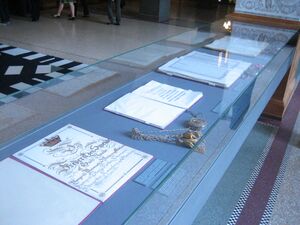Constitution of the Glanish Commonwealth: Difference between revisions
Jump to navigation
Jump to search
No edit summary |
|||
| Line 12: | Line 12: | ||
}} | }} | ||
The Constitution of the [[Glanish Commonwealth]] (Glanish: ''Grundlov''), sometimes referred to as the Second Glanish Constitution, is the supreme law of Glanodel. It is the second and current {{wp|constitution}} of Glanodel and establishes the Commonwealth as a {{wp|federal republic}} composed of 13 cantons ({{wp|federated state}}. Following the end of the [[Great War (Aeia)|Great War]] in 1899, a Constitutional Conference was held among the leaders of the Glanish Resistance Movement, which had served as the nation's ''{{wp|de facto}}'' provisional government. Drafting of the document began on 1 February 1900 and after seven revisions, the final draft was ratified on 5 March 1900. | <!--The Constitution of the [[Glanish Commonwealth]] (Glanish: ''Grundlov''), sometimes referred to as the Second Glanish Constitution, is the supreme law of Glanodel. It is the second and current {{wp|constitution}} of Glanodel and establishes the Commonwealth as a {{wp|federal republic}} composed of 13 cantons ({{wp|federated state}}. Following the end of the [[Great War (Aeia)|Great War]] in 1899, a Constitutional Conference was held among the leaders of the Glanish Resistance Movement, which had served as the nation's ''{{wp|de facto}}'' provisional government. Drafting of the document began on 1 February 1900 and after seven revisions, the final draft was ratified on 5 March 1900. | ||
The document is composed of a {{wp|preamble}}, which establishes the reasons for founding the Commonwealth and priorities of the new government, its six original articles. Its first three articles entrench the doctrine of {{wp|separation of powers}}, dividing the federal government into three branches (legislative, executive, and judicial). Article Four, often referred to as the ''Bill of Rights'', defines Glanish {{wp|citizenship}} and federally protected {{wp|individual and group rights|individual and popular rights}}, and establishes the federal institution of {{wp|referendum|popular referenda}}. Articles Five and Six entrench concepts of {{wp|federalism}}, describing the rights and responsibilities of cantonal governments and of the cantons in relationship to the federal government. | The document is composed of a {{wp|preamble}}, which establishes the reasons for founding the Commonwealth and priorities of the new government, its six original articles. Its first three articles entrench the doctrine of {{wp|separation of powers}}, dividing the federal government into three branches (legislative, executive, and judicial). Article Four, often referred to as the ''Bill of Rights'', defines Glanish {{wp|citizenship}} and federally protected {{wp|individual and group rights|individual and popular rights}}, and establishes the federal institution of {{wp|referendum|popular referenda}}. Articles Five and Six entrench concepts of {{wp|federalism}}, describing the rights and responsibilities of cantonal governments and of the cantons in relationship to the federal government. | ||
| Line 21: | Line 21: | ||
''Main article: [[History of Glanodel]]'' | ''Main article: [[History of Glanodel]]'' | ||
==Preamble== | ==Preamble== | ||
| Line 135: | Line 133: | ||
{{quote|''"A person is irrefutably entitled to donate their time and money in support of, or against, a candidate they chose. However, political influence should be reliant solely upon the status of a person's citizenship. Not a person's financial success, nor the virtues or status granted to them by birth should grant with that status any more or any less of a voice within our political process. Furthermore, the guaranteed right to contribute personal resources in favor of or against chosen candidates is a right reserved only by citizens and organizations founded by citizens for the express purpose of political action. A private enterprise is, by definition, not a single citizen, nor an organization founded for the purposes of political action. Thus, these entities do not reserve the right to donate in favor of, or against, a chosen candidate."''}} | {{quote|''"A person is irrefutably entitled to donate their time and money in support of, or against, a candidate they chose. However, political influence should be reliant solely upon the status of a person's citizenship. Not a person's financial success, nor the virtues or status granted to them by birth should grant with that status any more or any less of a voice within our political process. Furthermore, the guaranteed right to contribute personal resources in favor of or against chosen candidates is a right reserved only by citizens and organizations founded by citizens for the express purpose of political action. A private enterprise is, by definition, not a single citizen, nor an organization founded for the purposes of political action. Thus, these entities do not reserve the right to donate in favor of, or against, a chosen candidate."''}} | ||
Since this ruling, the federal government of Glanodel, along with several cantonal governments, have passed laws which mandate strict accountability and reporting requirements for all private organizations involved in political action. | Since this ruling, the federal government of Glanodel, along with several cantonal governments, have passed laws which mandate strict accountability and reporting requirements for all private organizations involved in political action.--> | ||
{{Template:Glanodel}} | {{Template:Glanodel}} | ||
Latest revision as of 21:35, 16 October 2022
| Constitution of the Glanish Commonwealth | |
|---|---|
 A photograph of the Constitution in its display case. | |
| Created | 21 February 1900 |
| Ratified | 5 March 1900 |
| Location | Presidential Library, Vænholm |
| Author(s) | Sebastian Thuesen, Otto Knudsen, Ivar Lange |
| Signatories | Alex Åberg (first President of Glanodel) |
| Purpose | Formation of the Commonwealth and Supreme Law of Glanodel |
